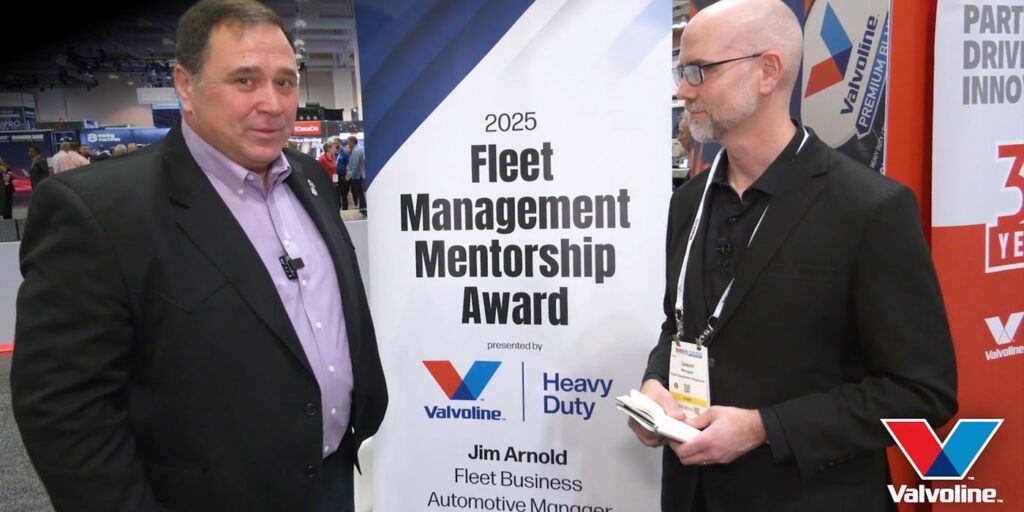Equipment managers are increasingly taking on responsibilities that extend beyond their traditional technical roles. As the complexities of fleet management grow and become more data-oriented, the function of fleet managers is evolving. Nowadays, fleet managers are required to combine leadership, mentorship, cost analysis, and safety oversight with a deep understanding of truck systems and service strategies.
Few individuals exemplify this balanced approach better than Jim Arnold, Fleet Business Automotive Manager at UPS, who was honored with the first Fleet Management Mentorship Award by Valvoline Global. With extensive experience overseeing one of North America’s largest fleets, Arnold provides crucial insights into leading effective fleet maintenance teams in today’s landscape.
Integrating Technical Know-How with Leadership in Fleet Management
According to Arnold, fleet equipment managers need to have a thorough knowledge of every component of their trucks—from engines and transmissions to rear differentials and diagnostic tools. “Understanding your fleet and the diversity of its components is vital,” he noted.
Leadership in fleet management necessitates more than technical proficiency. Managers must also foster diverse teams, mentor emerging technicians, and adapt to change without compromising safety or vehicle uptime. Arnold pointed out that “we can always educate,” stressing the importance of instilling a positive attitude and confidence in the team as they navigate challenges together.
Navigating Change in Fleet Management
Change management has become an integral aspect of a fleet manager’s role. Whether it’s adapting to new diagnostics software, responding to supply chain challenges, or rolling out safety initiatives, managers are tasked with helping their teams face uncertainty.
“Listening to your team’s needs and challenges is crucial,” Arnold explained. “You must empathize and provide the guidance and training necessary to facilitate change.” He highlighted the importance of patience and active engagement in mentoring technicians: “We will improve by learning from our mistakes and working together,” he added.
Balancing Cost Efficiency, Safety, and Fleet Strategy
Today’s fleet managers must be adept in data management and cost analysis. Arnold emphasized, “Cost considerations are paramount now. Understanding cost and data analysis offers a broader perspective on decision-making.” With UPS’s long-standing history dating back to 1907, adapting to evolving industry trends has been key to their success. “Adapting to the future is necessary,” Arnold noted.
Central to UPS’s mission is a commitment to safety. From CNG fleet safety norms to operational procedures on the shop floor, safety must influence every decision. “It’s essential to understand the strengths and weaknesses of your fleet,” Arnold stated. “At UPS, safety is our priority—our longstanding motto highlights our commitment to providing a safe and reliable service, driven by our fleet.”
Emphasizing Education and Certification in Fleet Management
For newcomers or those advancing in fleet maintenance management, Arnold suggests a combination of technical education and industry certifications. “Understand what you’re stepping into, whether it involves trailers, tractors, or package fleets,” he recommended. Knowledge of engine and transmission operations is crucial.
Additionally, he encourages aspiring managers to attain ASE fleet maintenance certifications, especially in diagnostics. “Gaining expertise in engine and transmission diagnostics is beneficial,” Arnold advised. “While having a college degree is invaluable, combining it with practical certifications will enhance your skillset.” As trucks grow more sophisticated, staying updated on software and tools is essential. “Continue learning as much as you can about various diagnostic tools and programming,” he urged, “as updates are continuously evolving.”
Final Insights for Truck Equipment Managers
Jim Arnold’s insights are clear: Modern truck equipment managers need to adapt alongside the industry. They should be technical authorities, effective communicators, committed mentors, and leaders prioritizing safety. By investing in their education and leading with compassion, managers can cultivate strong, future-ready teams.
“Let’s collaboratively explore and identify avenues for improvement,” Arnold concluded.
For more insights, watch the video above.


